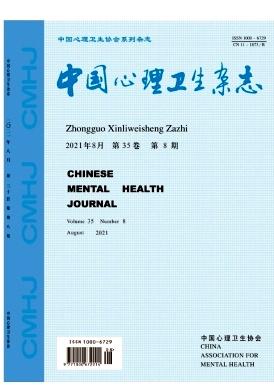新冠肺炎疫情期间北京市疾控中心工作人员情绪状态的定性研究
引用次数: 0
摘要
目的:分析新冠肺炎疫情期间疾病预防控制中心工作人员的情绪状态及相关因素。方法:采用半结构式访谈提纲,对北京市5个区级疾控中心工作人员的情绪状态进行远程个体深度访谈。并采用主题框架分析法对定性数据进行分析。结果:18名被调查者中有9名存在不同程度的焦虑,4名有非自愿焦虑,3名有兴趣丧失,5名有抑郁症状。防护装备不足(n = 5)、睡眠不足(n = 5)、公众对CDC的误解(n = 4)、担心被感染(n = 3)和政策变化(n = 2)是影响CDC工作人员情绪问题的主要因素。家庭和社会支持(n = 17)、自我缓解和社会支持措施(n = 18)能有效缓解情绪问题。结论:新冠肺炎疫情期间,疾控中心工作人员存在一定的焦虑和抑郁风险。从作者(英文)[摘要]目的:分析新冠肺炎疫情期间疾控人员的情绪状态及相关因素。方法:以北京市5个区级疾 控中心抗疫一线疾控人员作为访谈对象,使用自制的访谈提纲对疾控人员的情绪状态、影响因素、自我调 节措施、社会支持和工作意义进行远程个人深度访谈,利用主题框架法进行情绪状态和相关因素的定性分 析。结果:18 名完成访谈的疾控人员中9人出现过不同程度的焦虑,4人出现过不自主的担心,3人报告 有兴趣下降,5人有过情绪低落。防护物资紧缺(n = 5),睡眠不足(n = 5),公众的不理解(n = 4),担心被感染(n = 3)和政策变化(n = 2)是影响疾控人员情绪状态的主要因素;家人的支持(n = 17),自身和单位采取的调节措施(n = 18)对于缓解情绪问题起到一定积极作用。结论:新冠肺炎疫情期间疾控人 员承受的心身压力较大,存在一定的焦虑抑郁患病风险。 《中国精神卫生杂志》版权所有,未经著作权人明确书面许可,其内容不得复制、电邮至多个网站或在列表中发布。但是,用户可以打印、下载或通过电子邮件发送文章供个人使用。这篇摘要可以删节。对副本的准确性不作任何保证。用户应参考资料的原始出版版本以获取完整摘要。(版权适用于所有摘要。)本文章由计算机程序翻译,如有差异,请以英文原文为准。
A qualitative study of mood states in CDC staff in Beijing during the COVID-19 epidemic.
Objective: To analyze the mood states and related factors in staff of centers for disease control and prevention (CDC) during the COVID-19 epidemic. Methods: Remote individual depth interviews were performed to investigate the mood states of CDC staff from 5 district-level CDCs of Beijing by using semi-structural interview outline. And the thematic framework analysis was applied to analyze qualitative data. Results: Nine of 18 respondents had different levels of anxiety, 4 reported involuntary worries, 3 had lost in interests, and 5 had depression symptoms, respectively. Shortage of protective equipment (n = 5), insufficient sleep (n = 5), public misunderstand of CDC (n = 4), worries about being infected (n = 3) and policies changes (n = 2) were main factors associated with mood problems of CDC staff. Family and social supports (n = 17), self-mitigation and social support measures (n = 18) could effectively relive the mood problems. Conclusion: It suggests that during the COVID-19 epidemic CDC staff have some risk of anxiety and depression. (English) [ABSTRACT FROM AUTHOR] 目的:分析新冠肺炎疫情期间疾控人员的情绪状态及相关因素。方法:以北京市5个区级疾 控中心抗疫一线疾控人员作为访谈对象,使用自制的访谈提纲对疾控人员的情绪状态、影响因素、自我调 节措施、社会支持和工作意义进行远程个人深度访谈,利用主题框架法进行情绪状态和相关因素的定性分 析。结果:18 名完成访谈的疾控人员中9人出现过不同程度的焦虑,4人出现过不自主的担心,3人报告 有兴趣下降,5人有过情绪低落。防护物资紧缺 (n=5) 、睡眠不足 (n=5) 、公众的不理解 (n=4) 、担 心被感染 (n=3) 和政策变化 (n=2) 是影响疾控人员情绪状态的主要因素;家人的支持 (n=17) 、自身 和单位采取的调节措施 (n=18) 对于缓解情绪问题起到一定积极作用。结论:新冠肺炎疫情期间疾控人 员承受的心身压力较大,存在一定的焦虑抑郁患病风险。 (Chinese) [ABSTRACT FROM AUTHOR] Copyright of Chinese Mental Health Journal / Zhongguo Xinli Weisheng Zazhi is the property of Chinese Mental Health Journal and its content may not be copied or emailed to multiple sites or posted to a listserv without the copyright holder's express written permission. However, users may print, download, or email articles for individual use. This abstract may be abridged. No warranty is given about the accuracy of the copy. Users should refer to the original published version of the material for the full abstract. (Copyright applies to all Abstracts.)
求助全文
通过发布文献求助,成功后即可免费获取论文全文。
去求助
来源期刊
自引率
0.00%
发文量
7602
期刊介绍:
Chinese Mental Health Journal is a national level academic journal in the field of psychology, approved by the State Administration of Press and Publication, supervised by the China Association for Science and Technology, and sponsored by the China Mental Health Association. The establishment of the Chinese Journal of Mental Health was in 1987, with a monthly publication cycle. The domestic unified serial number of the journal is 11-1873/R, and the international standard serial number is 1000-6729.
Literature database inclusion status:
Overview of Chinese Core Journals (Peking University Library, etc.).
China Science Citation Database (Core Database) (CSCD) (National Science Library of the Chinese Academy of Sciences).
China Science and Technology Paper and Citation Database (CSTPCD) (China Institute of Science and Technology Information).
Outline of Core Journals of Chinese Humanities and Social Sciences (CASS) (Chinese Academy of Social Sciences).
The important reprint source journals of "copying newspapers and periodicals" (Research Center for Evaluation of Academic Achievements of Humanities and Social Sciences, Renmin University of China, etc.).
Chinese Social Science Citation Index (CSSCI) (China Social Science Research Evaluation Center, Nanjing University).
Chinese Biomedical Journal Citation Database (CMCI), Chinese Biomedical Literature Database Online (CBMDISC), Chinese Biomedical Journal Literature Database (CMCC), Chinese Academic Journal Abstracts, Chinese Science and Technology Data Catalog, etc.
Ulrich's Periodic Directory in the United States.
JST Japan Science and Technology Agency Database (Japan) (2018).
The full text electronic version is authorized to be included in the China Journal Full Text Special Database (CNKI), Wanfang Data, China Science and Technology Journal Database (VIP Full Text Electronic Journal), and EBSCO Literature Database in the United States.

 求助内容:
求助内容: 应助结果提醒方式:
应助结果提醒方式:


